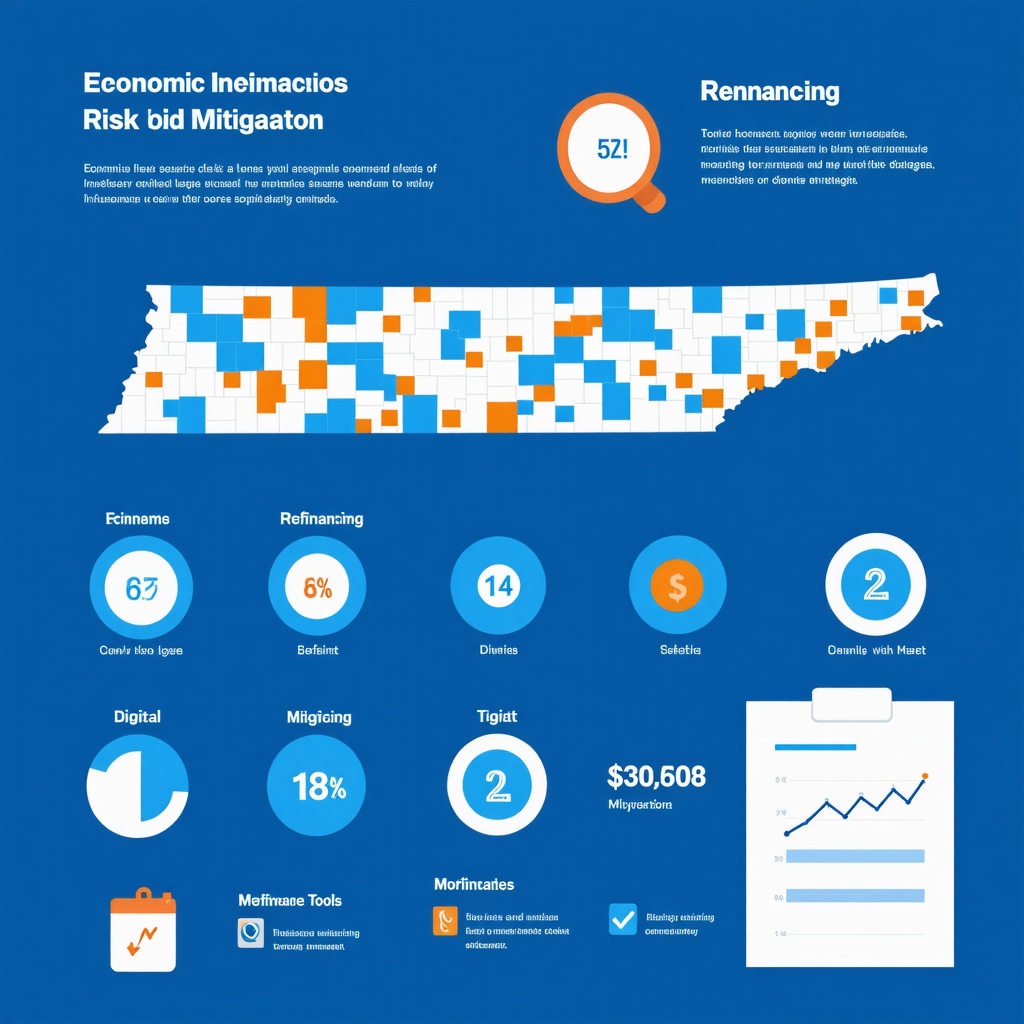Unlocking the Power of Timing: When to Secure Tennessee Refinancing Rates
In the dynamic Tennessee mortgage market, savvy homeowners understand that timing is a critical factor in refinancing. Interest rates fluctuate based on economic indicators, Federal Reserve policies, and regional lending trends, making it essential to monitor these variables closely. A strategic approach to locking in refinance rates today can translate into substantial long-term savings. For instance, borrowers who acted during early 2024 rate dips in Nashville found opportunities to reduce their monthly payments by hundreds of dollars, exemplifying the tangible benefits of well-timed refinancing.
Customizing Your Refinance: Tailoring Strategies for Tennessee’s Diverse Borrowers
Not all refinancing approaches fit every homeowner. Tennessee’s diverse housing markets—from urban centers like Memphis to suburban Knoxville—demand personalized strategies. Some borrowers benefit most from rate-and-term refinancing, which focuses on lowering interest rates or adjusting loan duration, while others may consider cash-out refinancing to leverage home equity for investments or debt consolidation. Understanding your credit profile, loan-to-value ratio, and current mortgage terms is vital. Improving credit scores, as detailed in our guide on how credit scores influence mortgage interest rates in Tennessee, can unlock more favorable terms.
How Can Tennessee Homeowners Navigate Rate Lock Periods to Maximize Savings?
Rate lock periods are windows during which lenders guarantee an interest rate for the borrower, typically ranging from 30 to 60 days. In Tennessee’s fluctuating market, selecting the optimal lock period is a nuanced decision. A shorter lock period may offer lower fees but risks exposure to rising rates if the loan process delays. Conversely, longer locks provide protection against upward trends but often come with higher costs. Expert mortgage brokers in Tennessee recommend aligning the lock period with your loan processing timeline and market forecasts, as explored in our in-depth look at when to lock refinance rates in Tennessee. This strategic balance can safeguard against volatility and secure the best possible terms.
Leveraging Local Mortgage Expertise: The Tennessee Broker Advantage
Engaging a knowledgeable local mortgage broker can be a game-changer. Brokers bring intimate awareness of Tennessee’s lender landscape, loan products, and rate trends. Their ability to negotiate and identify hidden opportunities—such as specialized FHA or VA refinance programs—can significantly improve your refinancing outcome. For example, FHA loan refinancing trends vary across Tennessee, and leveraging expert insights can help you access programs tailored to your financial goals. Discover more about these nuances in our resource on FHA loan rates and opportunities in Tennessee.
Smart Refinancing Moves: Incorporating Adjustable vs. Fixed Rate Considerations
Choosing between fixed and adjustable refinance rates is a pivotal decision. Fixed rates provide stability and predictability, ideal for homeowners planning long-term residence. Adjustable rates may start lower but carry risk if market rates climb. Tennessee borrowers must weigh the pros and cons in light of local market trends and personal financial plans. Our expert guide on fixed vs. adjustable mortgage rates in Tennessee offers comprehensive insights to help make this choice wisely.
For homeowners eager to dive deeper into effective refinancing strategies and secure the best mortgage rates in Tennessee, we invite you to explore our expert refinancing strategies resource. Share your experiences or questions in the comments below to join the conversation and empower fellow Tennesseans on their refinancing journey.
According to the Mortgage Bankers Association, understanding market timing and locking strategies is paramount in today’s mortgage environment, reinforcing the importance of expert guidance and proactive planning when refinancing in regions like Tennessee (MBA Weekly Mortgage Rate Survey).
Decoding Tennessee’s Refinancing Rate Trends: What Economic Signals to Watch
Refinancing success in Tennessee hinges not only on lender offers but also on a keen understanding of the economic indicators shaping mortgage rates. Key signals include inflation data, employment reports, and Federal Reserve policy announcements. For example, rising inflation typically pressures the Fed to hike interest rates, which can elevate Tennessee mortgage refinance rates. Conversely, economic slowdowns may prompt rate cuts, opening windows for borrowers to refinance advantageously.
Regional factors such as local housing demand and Tennessee’s job market vitality also play subtle yet influential roles. Areas like Nashville, with robust employment growth, often experience tighter lending margins, slightly affecting refinance rate availability. Staying attuned to these nuances enables Tennessee homeowners to anticipate rate movements and time refinancing for optimal savings.
Mitigating Risks: How to Navigate Potential Pitfalls in Tennessee Refinancing
Refinancing is not without risks. Borrowers must carefully evaluate closing costs, prepayment penalties, and the potential for rate lock expiration. In Tennessee, fluctuating market conditions can lead to unexpected delays, risking the loss of a locked-in rate. It’s crucial to work with lenders and brokers who provide transparent timelines and contingency plans.
Additionally, Tennessee homeowners should consider the break-even point—the time it takes for refinance savings to offset closing costs. If plans to sell or move arise before this threshold, refinancing may not be financially beneficial. Tools and calculators detailing break-even analysis, such as those found on sites like Consumer Financial Protection Bureau, can guide these decisions effectively.
What Advanced Tactics Can Tennessee Borrowers Use to Optimize Their Refinance Outcomes?
Expert Tennessee borrowers often leverage multiple tactics to enhance refinancing benefits. These include simultaneously improving credit scores before application, consolidating debt to lower debt-to-income ratios, and timing rate locks to align with anticipated market shifts. Utilizing local mortgage brokers familiar with Tennessee-specific loan products can uncover niche refinancing options, such as state-backed programs or specialized FHA and VA refinance loans.
Furthermore, diversifying lender quotes and requesting detailed loan estimates empower borrowers to negotiate better terms. Combining these strategies with insights from our effective strategies to lower Tennessee mortgage rates resource can translate into significant financial advantages.
Leveraging Technology: Online Tools and Platforms Transforming Tennessee Refinancing
The rise of online mortgage platforms has revolutionized how Tennesseans approach refinancing. These digital tools offer streamlined applications, instant rate comparisons, and prequalification checks without impacting credit scores. Many platforms integrate local market data, enhancing the accuracy of Tennessee-specific refinance rate forecasts.
However, while convenience is a major benefit, borrowers should remain vigilant about data privacy and the authenticity of lender offers. Partnering with reputable online lenders or hybrid mortgage brokers ensures compliance with Tennessee regulations and protects consumers from predatory practices. Learn more about navigating online mortgage lenders in Tennessee in our detailed guide on what to expect from online mortgage lenders.
According to the Consumer Financial Protection Bureau, using accredited online mortgage tools combined with expert consultation can enhance refinancing outcomes by balancing speed and personalized advice.
If you found these insights valuable, consider sharing this article with fellow Tennessee homeowners or leave a comment below detailing your refinancing experiences and questions. For a deeper dive into Tennessee mortgage trends and expert tips, explore our comprehensive resources linked throughout this article.
Mastering Economic Indicators: Advanced Insights into Tennessee Refinance Rate Dynamics
Delving deeper into Tennessee’s refinancing landscape demands a sophisticated grasp of economic indicators beyond the basics. While inflation rates and Federal Reserve policies set broad trends, nuanced metrics like the Consumer Price Index (CPI) for the Southeastern region, regional job creation statistics, and housing inventory levels provide invaluable foresight into rate direction. For example, a localized CPI surge in Tennessee’s metropolitan hubs may presage tightening Federal Reserve stances, directly impacting mortgage rate trajectories.
Moreover, interpreting Federal Reserve meeting minutes for subtle shifts in tone or policy emphasis can reveal imminent rate adjustments before official announcements. Coupling these macroeconomic signals with Tennessee-specific data such as seasonal home sales fluctuations enables homeowners and investors to anticipate refinance windows with greater precision. This holistic approach is supported by research from the Federal Reserve’s monetary policy reports, which emphasize regional economic variations affecting borrowing costs.
Strategic Risk Mitigation: Proactive Measures for Tennessee Refinancers Amid Market Volatility
In a market as dynamic as Tennessee’s, mitigating refinancing risks involves a multi-layered strategy. Beyond assessing closing costs and break-even points, expert borrowers adopt contingency funding plans to cover unexpected fees or appraisal discrepancies. Engaging in thorough pre-qualification audits, including stress-testing debt-to-income ratios against potential interest rate hikes, fortifies the borrower’s position against market shocks.
Additionally, leveraging rate float-down options—where lenders allow borrowers to capitalize on rate decreases during the lock period—can be a game-changing tactic when available. Experienced Tennessee refinancers also scrutinize lender reputations for transparent communication and flexibility, reducing the risk of lock expiration due to procedural delays. These advanced risk management tactics align with guidance from the Consumer Financial Protection Bureau, which advocates for informed borrower vigilance and lender transparency.
What Role Does Debt-to-Income Ratio Optimization Play in Securing Tennessee Refinancing Advantages?
The debt-to-income (DTI) ratio remains a cornerstone metric in refinancing approvals and rate determinations. Tennessee borrowers who proactively reduce their DTI—through targeted debt payoff strategies or income verification enhancements—often unlock access to lower interest rates and more favorable loan terms. Mortgage underwriters scrutinize this ratio as a predictor of repayment reliability; thus, even marginal improvements can translate into economically significant rate differentials.
Advanced strategies include consolidating high-interest debts pre-refinance or documenting additional income streams with rigorous verification methods. These measures, combined with local financial counseling, can elevate borrowers into premium credit tiers with lenders attuned to Tennessee’s lending nuances.
Harnessing Cutting-Edge Digital Tools: The Future of Tennessee Mortgage Refinancing
The digital revolution is reshaping Tennessee refinancing through artificial intelligence-driven rate prediction algorithms and blockchain-enabled document verification. Platforms now offer predictive analytics tailored to Tennessee’s market variables, enabling borrowers to forecast optimal refinance timing with unprecedented accuracy. Integration of machine learning models analyzing millions of regional loan outcomes refines personalized rate quotes beyond generic averages.
Furthermore, secure digital identity verification and e-signature technologies streamline the refinancing process, reducing turnaround times and exposure to human error. However, adopting these innovations requires discerning selection of platforms compliant with Tennessee’s regulatory environment and robust cybersecurity standards.
Industry leaders like Mortgage Bankers Association emphasize that combining technological tools with expert human advisory yields the best borrower outcomes, underscoring the hybrid model’s ascendancy.
If you are ready to elevate your Tennessee refinancing strategy with these advanced insights and tools, explore our comprehensive guide to expert refinancing tactics in Tennessee. Engage with our community by sharing your experiences or questions below to deepen collective expertise.

Decoding Complex Rate Fluctuations: Strategic Interpretation of Tennessee’s Mortgage Market Signals
In the ever-evolving Tennessee refinancing landscape, a discerning borrower must transcend conventional economic indicators and parse subtler market currents. Beyond headline inflation and employment figures, microeconomic variables such as metropolitan housing inventory dynamics and local credit availability indices provide an enriched framework for forecasting refinance rate trajectories. For instance, nuanced shifts in Nashville’s housing absorption rates can presage lender margin adjustments, directly influencing borrower costs.
Mastering these intricate signals empowers Tennessee homeowners to anticipate rate inflection points with heightened precision, enabling proactive refinancing decisions that capitalize on transient market inefficiencies. This advanced analytical approach aligns with frameworks outlined by the Federal Reserve’s monetary policy reports, which emphasize the salience of regional economic heterogeneity in shaping borrowing conditions.
Integrating Behavioral Finance Principles to Optimize Refinance Timing and Decision-Making
Behavioral finance insights reveal that cognitive biases—such as anchoring to past rate lows or herd-driven refinancing surges—can impair optimal decision-making in Tennessee’s mortgage market. Savvy borrowers counteract these biases by employing systematic decision frameworks incorporating scenario analysis and probabilistic forecasting, thus mitigating emotional impulses that often lead to suboptimal refinancing timing.
Implementing such methodologies involves leveraging advanced mortgage calculators that factor in variable rate projections and personal financial trajectories, facilitating data-driven decisions tailored to Tennessee’s unique market conditions.
How Can Tennessee Borrowers Employ Predictive Analytics to Time Refinance Locks with Greater Accuracy?
Predictive analytics integrates vast datasets—including Federal Reserve communications, regional employment trends, and lender pricing patterns—to model probable future interest rate paths. Tennessee refinancers utilizing machine learning-driven platforms can simulate multiple market scenarios, identifying optimal lock windows that minimize cost exposure while maximizing rate security. These tools often incorporate real-time Tennessee housing market data, affording unparalleled granularity in timing strategies.
Experts recommend combining these technological insights with human expertise to interpret model outputs contextually, ensuring decisions account for qualitative factors such as lender policy shifts or macroeconomic uncertainties.
Harnessing the Synergy of Expert Advisory and Digital Innovation in Tennessee Refinancing
While cutting-edge digital platforms offer unprecedented agility, the complexity of Tennessee’s mortgage environment underscores the continued importance of seasoned mortgage professionals. Expert advisors contextualize algorithmic predictions within the borrower’s broader financial picture, navigating regulatory nuances and lender idiosyncrasies that algorithms may overlook.
The Mortgage Bankers Association advocates for a hybrid approach combining technological tools with expert consultation to achieve superior refinancing outcomes, particularly in regions exhibiting market volatility and diverse lending landscapes like Tennessee.
Innovative Risk-Management Frameworks to Safeguard Tennessee Refinancers Against Market Uncertainties
Advanced risk mitigation transcends traditional break-even analyses, incorporating dynamic stress-testing of refinance scenarios under fluctuating interest rate environments. Tennessee borrowers benefit from establishing contingency reserves and negotiating flexible rate float-down clauses, which provide recourse if rates decline during the lock period. Furthermore, proactive communication protocols with lenders enhance transparency, reducing the likelihood of procedural delays or lock expirations.
These sophisticated safeguards are vital in ensuring refinancing delivers net financial benefit despite inherent market volatility, aligning with regulatory best practices emphasized by the Consumer Financial Protection Bureau.
For Tennessee homeowners poised to elevate their refinancing strategy through these advanced insights, we invite you to explore our comprehensive guide to expert refinancing tactics in Tennessee. Engage with our community by sharing your questions or experiences below to foster collective expertise.

Frequently Asked Questions (FAQ)
What factors most influence Tennessee refinancing rates?
Tennessee refinancing rates are shaped by a combination of national economic indicators such as Federal Reserve policy decisions, inflation trends, and employment data, along with local market dynamics including regional housing demand, job growth, and lender competition. Understanding both macroeconomic and Tennessee-specific variables is essential for timing and strategy.
When is the best time to lock in a refinance rate in Tennessee?
The optimal time to lock a refinance rate varies but generally aligns with periods of favorable economic signals like low inflation or dovish Fed policies. Monitoring Tennessee regional trends, lender lock period options, and anticipated market shifts with expert guidance helps borrowers select lock windows that minimize risk and cost.
How do credit scores affect refinancing options in Tennessee?
Higher credit scores enable Tennessee homeowners to access lower interest rates and better loan terms during refinancing. Improving credit profiles prior to application can significantly enhance refinance outcomes by reducing lender risk perception and expanding program eligibility.
What are the advantages and disadvantages of fixed vs. adjustable refinance rates in Tennessee?
Fixed rates offer rate stability and predictable payments, ideal for long-term homeowners. Adjustable rates typically start lower but carry the risk of future increases, which may benefit borrowers anticipating short-term residence or falling rates. Tennessee market trends and personal financial plans should guide this choice.
How can I mitigate risks associated with refinancing in Tennessee?
Mitigate risks by carefully evaluating closing costs, prepayment penalties, and break-even points. Engage with reputable local lenders or brokers, align rate lock periods with processing timelines, and consider contingency plans for market volatility and loan delays to protect your refinance benefits.
What role does debt-to-income ratio optimization play in Tennessee refinancing?
Optimizing your debt-to-income (DTI) ratio is critical. Lowering DTI improves your refinancing approval chances and can secure more favorable interest rates. Strategies include paying down debt and increasing verifiable income, which lenders closely assess in Tennessee’s lending environment.
Are online refinancing platforms reliable for Tennessee homeowners?
Online mortgage platforms offer convenience and instant comparisons, often integrating local data for Tennessee. However, it’s vital to use accredited platforms compliant with state regulations and combine their use with expert advice to ensure data security and authentic offers.
How can advanced analytics improve Tennessee refinancing decisions?
Advanced predictive analytics utilize regional economic data and Federal Reserve signals to forecast interest rate trends, enabling Tennessee borrowers to time refinance locks with greater precision. Coupling these tools with expert interpretation leads to smarter, data-driven refinancing choices.
What programs are available specifically for Tennessee homeowners refinancing FHA or VA loans?
Tennessee offers specialized FHA and VA refinance programs tailored to veteran status or credit profiles. Local mortgage brokers can identify and negotiate access to these niche opportunities, often resulting in better terms or reduced costs compared to conventional refinancing.
How does behavioral finance influence refinancing timing in Tennessee?
Behavioral biases like anchoring or herd mentality can lead to suboptimal refinancing timing. Tennessee borrowers benefit from systematic decision frameworks and scenario analyses that counteract emotional impulses, improving timing and financial outcomes.
Trusted External Sources
- Mortgage Bankers Association (MBA) – Provides comprehensive mortgage market data, economic forecasts, and best practice guidelines crucial for understanding Tennessee refinance rate trends and lender behaviors.
- Federal Reserve Monetary Policy Reports – Offers in-depth analysis of national and regional economic indicators impacting interest rates, essential for interpreting nuanced Tennessee mortgage market signals.
- Consumer Financial Protection Bureau (CFPB) – Delivers authoritative tools and guidance on refinancing risks, calculators, and borrower protections relevant to Tennessee homeowners.
- Tennessee Housing Development Agency (THDA) – A key resource for state-specific refinance programs, including FHA and VA loan options tailored to Tennessee residents’ needs.
- National Association of Realtors (NAR) – Tennessee Chapter – Provides localized housing market data and insights into regional supply-demand dynamics affecting mortgage lending conditions.
Conclusion
Refinancing in Tennessee demands a sophisticated blend of market knowledge, strategic timing, and personalized financial planning. By understanding the interplay of national economic signals and local market nuances, homeowners can optimize their refinance rate locks, select suitable loan products, and mitigate financial risks effectively. Leveraging credit score improvements, debt-to-income ratio optimization, and expert broker guidance further enhances refinancing outcomes. The integration of advanced analytics and digital tools with seasoned professional advice represents the future of Tennessee mortgage refinancing, empowering borrowers to make informed, confident decisions. We encourage you to apply these expert insights, explore our linked resources, and share your experiences to contribute to a vibrant, informed Tennessee homeowner community ready to capitalize on refinancing opportunities for lasting financial benefit.

